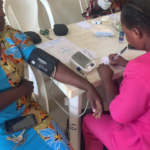2023 marked a turning point for Nigeria’s economic situation—and not for the better. The removal of fuel subsidies and the naira’s devaluation triggered rampant inflation, resulting in staggering rises in the transportation costs, food prices and the general cost of living. As in public discourse, these economic groans have slipped into informal conversations. Nigerian youths continually post on their social-media feeds “Cost of living wants to kill the living,” young Nigerians quip on social media, a reference to the cost-of-living crisis.
With no reprieve in sight, many citizens are coming to build some degree of financial resilience. As one youth said in a recent conversation, “You can’t expect to survive this economy with just one source of income,” remarked a Nigerian youth recently. Her view is shared by many others.
This realization is perhaps a major reason why such terms as side hustle, urgent 2k are now so commonplace on Nigeria’s social media. Young Nigerians are hunting for unconventional means to augment their income and boost their financial resilience.
Building that resilience, however, takes more than a side hustle. On social media, stories abound of people who become indebted after months of securing life-changing income. What could be the cause of this?
Understanding the reason for the sudden indebtedness shows that it takes not only an extra income but also financial literacy to weather the increasing economic crisis Nigeria finds itself in.
While this should be general knowledge, statistics state otherwise: 38% of the Nigerian adult population is financially literate, suggesting that a bigger chunk of the populace lack the requisite knowledge to make informed money decisions.
By all measure, this deficit is largely due to a limited access to quality financial education. Although youths have expressed their interest in managing their finances, Nigeria’s education curriculum has made no provision for financial education, even at the tertiary level.
Additionally, Nigerians give priority to their immediate survival than financial investment.
The consequences of the country’s low financial literacy level is more far-reaching than we realize. Ponzi schemes and other money scams targeting elderly Nigerians have become rampant. In addition to these growing scams, the older cohort swing through years after retirement without financial security.
A far-reaching consequence of a lack of financial literacy would be the uninformed citizenry that can neither question the policies of the government nor contribute to them.
Nevertheless, the rapid advances in technology have helped to enhance knowledge with expanded access to wisdom not readily accessible years earlier. “Google is your friend” or “Just check YouTube” attest to the educational benefits of technology.
In addition to Google and YouTube are several initiatives that are empowering youths with fiscal literacy. A few examples are Money Africa, Cowrywise Campus Ambassador program, Enhancing Financial Innovation and Access (EFInA) organization.
The government shares in the credits too. The National Financial Inclusion Strategy, launched in 2012 by ex-President Goodluck Jonathan, increased formal financial inclusion to 64% from 56% in 2020, according to the Enhancing Financial Innovation and Access (EFInA) 2023 survey.
More so, schools, such as the Universiy of Abuja, are taking practical steps to educate their students on using health insurance to stave off rampant hikes.
With organizations taking steps like these, a financial literate population is possible. However, Nigeria still operates on different traditional beliefs and cultures that discourage open discussions of money or finances. The issue of integration of financial education into the education curriculum has also not been addressed by the government.
Increasing awareness through social media can help greatly in boosting financial literacy in Nigeria. But there is only so much financial literacy can solve without a stable economic environment that allows a financially literate population to thrive.
In 2023, Nigeria faced significant economic turmoil due to the removal of fuel subsidies and naira devaluation, resulting in steep inflation. This has led to a surge in living costs, sparking discussions on financial resilience among Nigerian youths who now commonly seek additional income through side hustles.
However, merely earning more isn't enough to combat the crisis; financial literacy is crucial. Only 38% of Nigerian adults are financially literate, largely due to the lack of financial education in the curriculum, even at the tertiary level. This gap contributes to increased vulnerability to financial scams and poor economic decisions.
Technology and several initiatives—like Money Africa and the Cowrywise Campus Ambassador program—are working to improve financial literacy. The National Financial Inclusion Strategy has also made strides in increasing financial inclusion. However, cultural barriers and inadequate curriculum integration remain significant challenges. Social media can aid in spreading awareness, but a stable economic environment is essential for these efforts to be truly effective.






